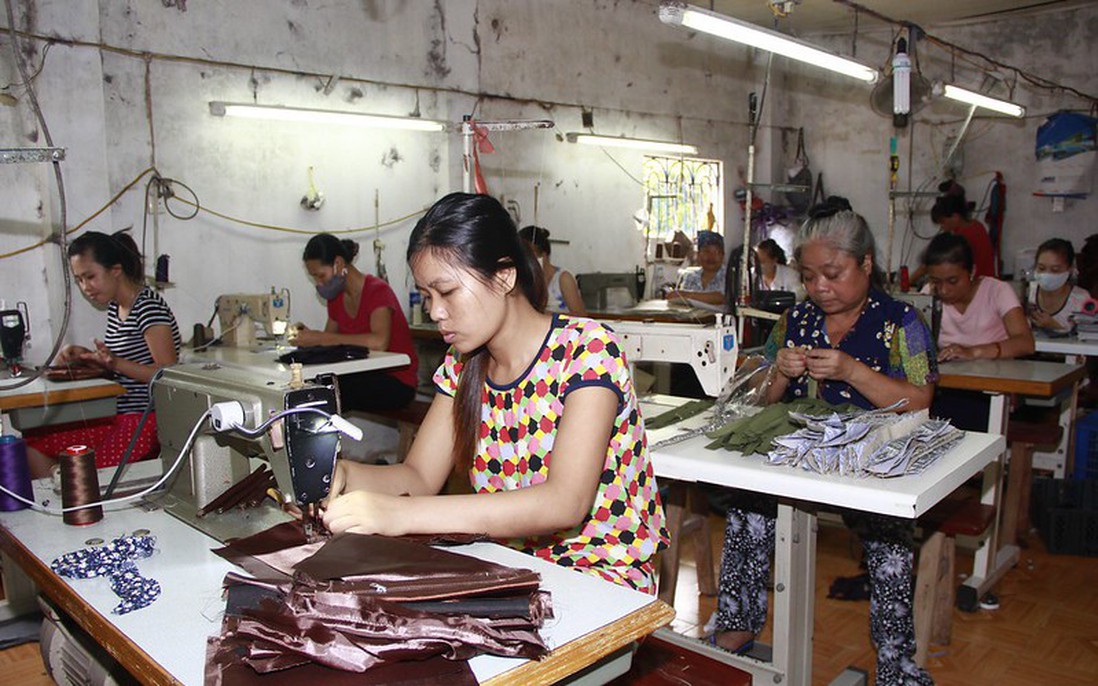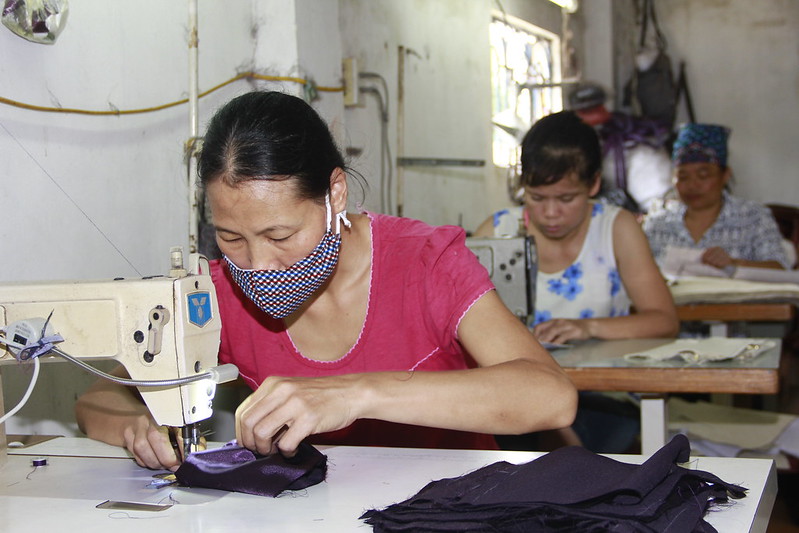Garment workers struggle to exercise their right to access information
Author: PVH
This article has been translated from its original source in Phunu Vietnam: Khoảng trống năng lực tiếp cận thông tin của lao động dệt may
The level of awareness and access to information among textile and garment workers, particularly regarding company welfare and relevant policies, remains a “blind spot” for many workers, especially in small and medium-sized enterprises.
Challenges in implementing the right to access information of textile and garment workers
The Household Consumption Expenditure Survey conducted by Asia Floor Wage Alliance in 2024 among garment workers in eight Asian countries (Bangladesh, Cambodia, India, Indonesia, Myanmar, the Philippines, Sri Lanka, and Vietnam) found that the garment industry in Vietnam employs over 2.7 million workers. More than 70% of them are women, making it one of the largest employment sectors in the country. Of the workers surveyed, over 55% were under the age of 35, while only 13% were over 45 years old.
Notably, the garment industry relies heavily on a low-skilled workforce. One-third of surveyed workers had only completed primary education, while 37% had finished high school. Only 20% had attained college or university-level education. This reflects the industry’s widespread dependence on workers with limited education and skills. As a result, workers often face lower wages, limited opportunities for career advancement, and restricted access to better job positions within the sector.

In reality, garment workers’ awareness and access to information, particularly regarding labour rights, wages, and social protection policies, remain limited. For many workers, this is still a major “blind spot.” Trần Thị Hảo, a garment worker at a small workshop in Cầu Bươu (Thanh Trì District, Hanoi), shared that she has worked on a casual basis for over three years for a neighbour’s workshop. However, the job is highly unstable, sometimes requiring long hours of overtime, while at other times, there is no work available. Her wages are calculated on a daily basis, at around 250,000 VND (roughly 10 USD). Hảo admitted that when she accepted the job, the only thing she asked about was the pay. She has a limited understanding of other entitlements, such as insurance, social insurance schemes, sick leave, and maternity benefits.
Nguyễn Thu Huyền, the owner of a garment workshop in Thường Tín District, Hanoi, shared that her family runs a garment factory that currently employs 40 regular workers. According to Huyền, one of the biggest challenges for female workers in rural areas is the lack of access to information and opportunities for skills development. Even as a business owner, she admitted that she herself rarely has the chance to stay updated on labour policies or new developments.
Earlier this year, Huyền’s workshop experienced a surge in outsourcing orders, resulting in more overtime and increased income for the workers. However, she was surprised when, starting in April 2025, new contracts suddenly came to a halt. Clients suspended orders due to uncertainty over U.S. tariff policies. Huyền acknowledged: “Lacking access to information and not staying updated puts us, especially women workers, at a serious disadvantage. It leaves us unprepared, less responsive, and unable to adapt quickly in our business operations.”

According to Ms. Nguyễn Hoàng Mai, Master of Laws and senior lecturer at the Trade Union University, the right to access information is a key factor in building a transparent, fair, and stable working environment. However, the implementation of this right still faces numerous challenges.
A major barrier in the garment industry today is workers’ limited access to information, largely due to the lack of available and reliable sources. According to the Better Work Vietnam Program in 2023, 18% of factories had internal regulations that did not comply with labor laws, 9% failed to disseminate anti-sexual harassment policies, and 32% had unsafe electrical practices. Additionally, around 25% of factories had not installed or maintained effective fire alarm systems. “These figures clearly show that many enterprises have not taken their obligations seriously when it comes to disclosing information related to workers’ rights and working conditions,” said Ms. Nguyễn Hoàng Mai.
Increasing access to information promotes sustainable development
At the workshop “Enhancing the capacity to access information for Vietnamese textile and garment workers- Current situation and solutions”, recently organised by the Vietnam Textile and Garment Trade Union, Mr. Cao Manh Cuong – the secretary of the Youth Union of Hoa Tho Textile and Garment Joint Stock Corporation said that young workers in the textile and garment industry have many opportunities to access technology, but still face many difficulties in accessing internal information such as: salary, contract, social insurance, labor regulations… If the information is not transparent, it will make young workers feel sceptical, passive, and reduce motivation and trust in the business. Therefore, it demonstrates that businesses must provide clear information about promotion criteria, training opportunities, assessment periods, and other relevant details, enabling workers to work diligently, set goals, and feel motivated to dedicate their efforts to the business.
According to experts, the majority of textile and garment enterprises are small and medium-sized enterprises (SMEs), accounting for more than 88%. They often lack a specialised human resources department and lack funds to invest in internal information systems. Information is mainly communicated through paper notices, word of mouth, group meetings at the beginning of the shift, and social networking groups such as Zalo and Facebook. Although convenient and cost-effective, this method lacks structure, is prone to errors, is difficult to verify, and cannot be stored.
According to Dr. Hoang Xuan Hiep – Hanoi University of Industry, limited access to information by workers, non-transparent information, leads to a direct consequence: “Loss of trust in labour relations”. Workers do not understand the policy, easily misunderstand, and suspect the business of “hiding information”. Lack of dialogue and information exchange will increase conflicts, gradually accumulate and erupt in the form of disputes, collective resignations, and businesses will find it difficult to develop sustainably.
